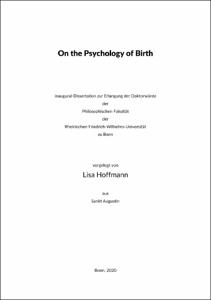On the Psychology of Birth

On the Psychology of Birth

| dc.contributor.advisor | Banse, Rainer | |
| dc.contributor.author | Hoffmann, Lisa | |
| dc.date.accessioned | 2020-11-17T10:26:01Z | |
| dc.date.available | 2020-11-17T10:26:01Z | |
| dc.date.issued | 17.11.2020 | |
| dc.identifier.uri | https://hdl.handle.net/20.500.11811/8783 | |
| dc.description.abstract | In this dissertation thesis, I propose the theoretical construct of a birth-related mindset and direct and indirect measures for its assessment. I assume that childbirth can be mentally presented as a rather natural (natural mindset) or a rather medicalized (medicalized mindset) event and that, in addition to medical factors, the birth-related mindset causally influences labor and birth. In three initial studies (Study 1: N = 117, Study 2: N = 206, Study 3: N = 192), I aimed to explore whether the proposed birth-related mindset is related to the retrospectively reported process of labor and birth (operationalized e.g., by performed interventions, duration of birth, place of birth). In a final longitudinal study (divided into sub-component Studies 4, 5, and 6) I examined the causal effect of the mindset and expanded the research question to address the relevance of birth experience for short- and long-term psychological well-being. Results of Study 4 (N = 311) could be integrated into a Single indicator model, displaying a sequential process: women with a prenatally more natural mindset were more likely to have low-intervention births, which resulted in a more positive evaluation of the birth experience, which in turn predicted well-being in the first weeks after birth (measured with Ecological Momentary Assessment), and subsequently postpartum depression and post-traumatic stress symptoms (eight weeks and six month after birth) as well as mother-infant-attachment six months after birth. In a fifth study (N = 304) the results could be replicated for a male sample. In a sixth study (N = 304 dyads) results further indicated that relationship quality can have a positive impact on the woman’s birth experience and on transition to parenthood for both sexes. The indirect measure I used to assess implicit aspects of both the birth-related mindset and attitude towards the partner did not yield meaningful results. Overall, the studies demonstrate the relevance of psychological factors for childbirth. The construct of a birth-related mindset could contribute to a better understanding of childbirth and help to make women’s birth experiences safer and more satisfying and improve the transition to parenthood for the whole family. | en |
| dc.language.iso | eng | |
| dc.rights | In Copyright | |
| dc.rights.uri | http://rightsstatements.org/vocab/InC/1.0/ | |
| dc.subject | Geburt | |
| dc.subject | Geburtserleben | |
| dc.subject | Mindset | |
| dc.subject | Psychologie der Geburt | |
| dc.subject | Geburtsoutcomes | |
| dc.subject | Birth | |
| dc.subject | Birth experience | |
| dc.subject | Psychology of Birth | |
| dc.subject | Birth outcomes | |
| dc.subject.ddc | 150 Psychologie | |
| dc.title | On the Psychology of Birth | |
| dc.type | Dissertation oder Habilitation | |
| dc.publisher.name | Universitäts- und Landesbibliothek Bonn | |
| dc.publisher.location | Bonn | |
| dc.rights.accessRights | openAccess | |
| dc.identifier.urn | https://nbn-resolving.org/urn:nbn:de:hbz:5-60394 | |
| ulbbn.pubtype | Erstveröffentlichung | |
| ulbbnediss.affiliation.name | Rheinische Friedrich-Wilhelms-Universität Bonn | |
| ulbbnediss.affiliation.location | Bonn | |
| ulbbnediss.thesis.level | Dissertation | |
| ulbbnediss.dissID | 6039 | |
| ulbbnediss.date.accepted | 25.09.2020 | |
| ulbbnediss.institute | Philosophische Fakultät : Institut für Psychologie | |
| ulbbnediss.fakultaet | Philosophische Fakultät | |
| dc.contributor.coReferee | Neyer, Franz J. |
Dateien zu dieser Ressource
Das Dokument erscheint in:
-
E-Dissertationen (707)




